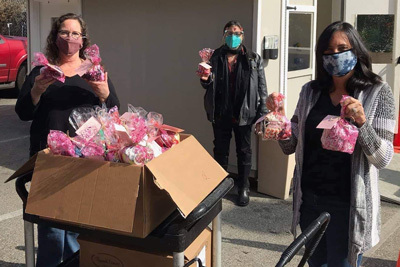Los Angeles Jewish Home Salutes All Volunteers


Los Angeles Jewish Home Salutes All Volunteers

Each April, organizations around the country celebrate National Volunteer Week, recognizing the hardworking people who give their time and energy to make a positive difference in their communities. Volunteers at the Los Angeles Jewish Home go above and beyond—and this year, we salute their service with particular gratitude for their efforts to keep our seniors safe and healthy during the pandemic.
"On an annual basis, we typically benefit from approximately 500 volunteers," says Stacy Orbach, the Jewish Home's director of volunteer services. "In addition to individuals, we also receive volunteer assistance from school groups, synagogue and church groups, fraternities and sororities, summer camps, companies, and more. They represent a wide range of backgrounds and ages. It's so wonderful to see people come together to enrich our residents' lives."
COVID-19 complicated volunteer work at the Jewish Home, but volunteers persevered. Although in-person visits to the Home were temporarily not allowed as a safety measure, volunteers found creative ways to keep giving back, letting residents know they had not been forgotten.

"It's been a challenging time, and volunteers haven't been able to come on our campuses, but they've still 'shown up' in many amazing ways," Stacy says. "Volunteers collected special items that our residents love, including cute calendars and sweet treats, delivered them with love. When the quarantine began, and there was a need for masks and gowns, I posted our need on the websites of local sewing groups, and suddenly we had 50 or 60 people donating their talents and sending us homemade/sewn facemasks. The community of volunteer seamstresses also sewed thousands of sleeves onto hospital gowns as part of the Home's 'Gown Kit' campaign. We also have one volunteer who comes by every month to change residents' watch batteries, free of charge—she sets up a little workshop in her car."
The volunteers' generosity, Stacy says, has been incredible. "One member of The Guardians support group works for an online flower company. She said she wanted to send us roses for Love and Friendship Day, which we celebrate every February 14th. I shared that in order for every resident to get one flower, we'd require 500 of them; she sent us 800 entire bouquets instead," she enthuses. "Our residents were overwhelmed with the kindness—it was so meaningful for them!"
Stacy says she has been moved by all of the volunteers staying in touch. "I have volunteers emailing me and asking when they will be able to return to their volunteer positions with the residents. They're eager to resume the valuable work they do and to contribute to the well-being of our residents. They're also anxious to assist our staff, whom they know are putting in so many hours to make sure residents are well-cared for and happy," she says.

Typically, during National Volunteer Week, the Jewish Home organizes an in-person volunteer appreciation lunch, complete with speeches from Jewish Home leadership, thanking the volunteers for their ongoing support. This year, Stacy says, will be different but no less heartfelt.
"We still can't meet in person, but we want our volunteers to know how much we value them, so we're sending them certificates of acknowledgement along with 'Outstanding Volunteer' lapel pins," she says. "Once they're able to come back on campus, they'll be able to wear the pins proudly, and everyone will know what heroes they are!"
The Jewish Home is always looking to expand our family of volunteers. To learn how to get involved, contact Stacy Orbach at [email protected].